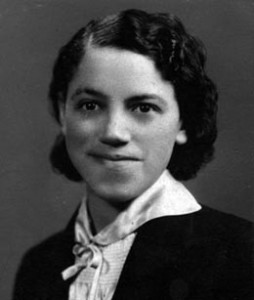My most unforgettable person, Lillian Walker
We begin our celebration of Black History month with this reminiscence of an unforgettable person. John Hughes is the Chief Oral Historian for the Legacy Project, Office of the Secretary of State.
From the desk of John Hughes, Historian.
In my half century as a journalist and historian, I’ve interviewed three U.S. presidents, governors and senators galore, movie stars and members of the Rock and Roll Hall of Fame. But the most unforgettable person I’ve ever met was a tiny, self-effacing 95-year-old African American lady from Bremerton. When Martin Luther King Jr. was still in junior high, Lillian Walker was staging sit-ins and protest marches in Kitsap County and lobbying legislators in Olympia for fair housing laws, yet few outside Kitsap County knew her story.

Lillian Walker and her husband James arrived in Washington State from Illinois in the spring of 1941. They quickly landed jobs at the booming Bremerton naval shipyard. With Europe in Fascist flames, FDR had vowed that America would be “the great arsenal of democracy.”
Before the war, only about 100 blacks lived in Bremerton. By 1944, there were 4,600. The newcomers had come from all over America, especially the South and the industrial cities of the North, happy to have jobs and expecting to leave Jim Crow behind. Many racists made the same trip, however, joining earlier transplants and home-grown bigots. Bremerton-area cafes, taverns, drug stores and barber shops displayed signs saying, “We Cater to White Trade Only.”
Mrs. Walker became the recording secretary for the Puget Sound Civic Society, a civil rights coalition, and helped found the Bremerton branch of the NAACP. She was 31 years old and flabbergasted that prejudice was so prevalent in a place where the air was clean and “everything was green.” She always said, “Well, you’re either with me or against me. And if you’re against me, that means we’re going to have to fight!” She went on to become state secretary of the NAACP. The Walkers were active in the push for a Fair Employment Practices Act, which was enacted by the Legislature in 1949. The Walkers, the NAACP and Church Women United scored a major legal victory in 1954 after a Bremerton drug store owner refused to let James Walker buy a cup of coffee at his soda fountain.
Helping to found the YWCA of Kitsap County was one of Mrs. Walker’s proudest achievements. She also became chairman of the Regional Library Board. In 1997, Kitsap County’s Martin Luther King Memorial Scholarship Fund Committee named the Walkers “MLK Citizens of the Century” for producing a total of 100 years of service to the community and the nation. James Walker said he was surprised because he didn’t think the work they’d been doing “was such a big deal.” Lillian added, “We knew we had a lot of friends, but getting this award for doing what we thought was right … well, I feel really honored.”
James Walker died at 89 in 2000. They were married for 59 years. Lillian carried on. She was “deeply humbled” by all the awards she received as she marched toward 100, quipping that she had just “out-lived” most everyone else in the running. The PTA gave her its Golden Acorn. The YWCA gave her its Founder’s Award and the Democrats presented her their Lifetime Achievement award. The NAACP called her “a living treasure.” She was particularly proud of the 2009 Liberty Bell Award from the Kitsap County Bar Association. Her friend Robin Hunt, a judge on the Washington Court of Appeals, nominated her, saying that Mrs. Walker had “contributed in countless ways to the effective functioning of our government and promoted better understanding of our Constitution, the Bill of Rights and the rule of law. Her courageous persistence to insist on equal rights has brought about change in our community. … She is the living embodiment of Lincoln’s Emancipation Proclamation and Martin Luther King’s dream. And she has accomplished these goals without rancor, but rather with an attitude that others simply needed to be ‘educated.’ ”
Mrs. Walker died at 98 in January 2012. She had seen her life story become one of the most-read books produced by the Secretary of State’s Legacy Project.
Here’s the link:
http://sos.wa.gov/legacyproject/oralhistories/lillianwalker/default.aspx.